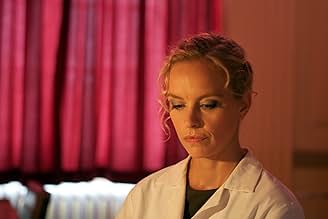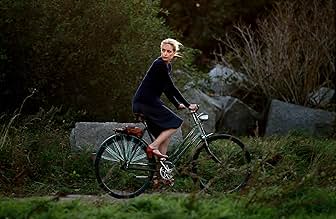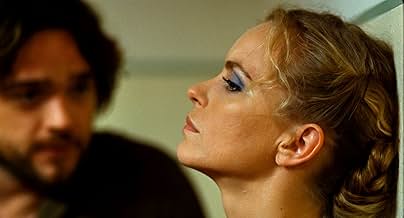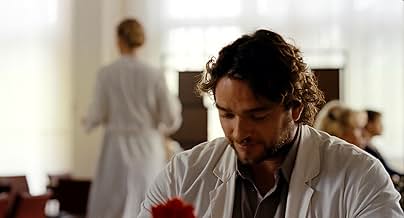A doctor working in 1980s East Germany finds herself banished to a small country hospital.A doctor working in 1980s East Germany finds herself banished to a small country hospital.A doctor working in 1980s East Germany finds herself banished to a small country hospital.
- Director
- Writers
- Stars
- Awards
- 10 wins & 24 nominations total
Claudia Geisler-Bading
- Stationsschwester Schlösser
- (as Claudia Geisler)
- Director
- Writers
- All cast & crew
- Production, box office & more at IMDbPro
Featured reviews
Looking back at 1980 East Germany director Christian Petzold conjures up a dreary Orwellian world of suppressed emotions, police state invasiveness and a simmering yearning for something better. The work of Cinematographer Hans Fromm creates an atmosphere of almost perpetual colorless twilight and Petzold's laconic scenes and long takes create a subtle but omnipresent feeling of oppression and paranoia.
In a beautifully understated performance Nina Hoss (Barbara) is a doctor whose desire to leave East Germany results in her being punished through relocation to a rural village clinic where she encounters clinic chief Ronald Zehrfeld (Dr. Reiser). Reiser appears to be sympathetic but she is reluctant to trust him. Jasna Fritzi Bauer is Stella a young girl who constantly escapes juvenile work camps seeking refuge at the clinic. Mark Waschke is Jorg a well-to-do foreigner who loves Barbara and offers to help her escape to Denmark where they can be together. Rainer Bock is a Stasi officer who periodically subjects Barbara to strip searches in an attempt to harass and prevent her from fleeing.
"Barbara" is a quiet character piece. It's a subtle, tense, humanistic drama not ideally suited for audiences of plot-driven pictures. Nina Hoss deserves serious consideration from the Academy as hers is one of the best performances by an actress this year.
In a beautifully understated performance Nina Hoss (Barbara) is a doctor whose desire to leave East Germany results in her being punished through relocation to a rural village clinic where she encounters clinic chief Ronald Zehrfeld (Dr. Reiser). Reiser appears to be sympathetic but she is reluctant to trust him. Jasna Fritzi Bauer is Stella a young girl who constantly escapes juvenile work camps seeking refuge at the clinic. Mark Waschke is Jorg a well-to-do foreigner who loves Barbara and offers to help her escape to Denmark where they can be together. Rainer Bock is a Stasi officer who periodically subjects Barbara to strip searches in an attempt to harass and prevent her from fleeing.
"Barbara" is a quiet character piece. It's a subtle, tense, humanistic drama not ideally suited for audiences of plot-driven pictures. Nina Hoss deserves serious consideration from the Academy as hers is one of the best performances by an actress this year.
This brilliant German film explores two fundamental questions: whether it is possible to collaborate with a fundamentally oppressive state, and the acute degree of personal loneliness felt by those who cannot, and whom the state thereby treats as its enemies. The mundane depersonalisation of life under the Stasi is captured much more acutely, it seems to me, in this story than in the more acclaimed 'The Lives of Others'; that the leading collaborator is arguably a decent and attractive person, albeit one who has made different choices to the admirable but not wholly likable heroine, adds subtlety and humanity to the overall portrait of society. Both protagonists are excellent in their roles; the camera-work captures the underlying feelings of alienation in a way that reminded me of early Kieslowski. 'Barbara' is by turns bleak, poetic, emotional and thought-provoking: it deserves to be more widely known.
It's a challenging task to depict a bygone era which hasn't yet passed into history, but is a living memory in the minds of many. Distant events may be easily interpreted at will, because no spectator can expect a minute reconstruction of a reality past. Adaptations of recent events, however, fall under close scrutiny of those who were actually there, and any attempt to 'tell the whole story' will invariably meet with criticism from those who feel left out of the picture, or who remember differently. It is therefore the best solution for the film maker to focus on atmosphere rather than events, and a simple story rather than a complex rendition of society as a whole. And that's what director/ screenwriter Christian Petzold does: he tells the story of a doctor, displaced from the capital to the province for an application to leave the country, and confronting an atmosphere of distrust while preparing her escape to the West. This routine of hostility is a little ameliorated by the interest of a male colleague, who may however be an assigned informer, and the friendship to a pregnant patient, who apparently escaped from a juvenile offenders camp only to be recaptured.
What makes me consider this film as far superior to the much lauded, Oscar-winning 'The Lives of Others' is that it does not sacrifice atmosphere to film making conventions. For instance, there is no music, because there was no music. 'The Lives of Others' tormented any actual witness of the times it described with a sappy soundtrack. It also did not correspond to my recollections of East Germany because it limited the supervision of ordinary citizens to the Stasi ('State Security') and its collaborators. It did point out that this supervision was omnipresent, but it created a division between good and evil which was slowly eroded from the evil side's end. 'Barbara', however, focuses on the way ordinary citizens, not intellectuals, were treated, and the fact that virtually everyone collaborated in the supervision of the individual, whether they were working with the Stasi or not. Barbara is fully aware of her situation, and tries to make friends with her colleague/informer André Reiser to win him over to her side, while at the same time not giving anything away about herself. Reiser, on the other hand, tries to gain her trust as a person, because he needs her competence at work and may be romantically interested in her, while at the same time fulfilling his obligations to report on her.
This constant game of hide and seek illustrates what Socialism was really like - a permanent grey zone in which you had to measure your steps carefully and no clear distinctions between good and evil existed, as 'The Lives of Others' would have you believe; and the young patient side characters show that quite a few cracked under this immense pressure. By focusing on one woman's story, director Petzold delivers an accurate portrait of the realities of life at that time: it did not matter whether you were good at your job or not, and being too good made you automatically suspicious, while being lazy made you the target of accusations of boycotting society; it was dangerous to open up to colleagues, because they would almost certainly be inquired about what you said, but at the same time it was dangerous to distance yourself, because then you'd be suspected of having something to hide. Everything was tactics, nothing was spontaneous, everybody wanted to get out, but chastised those who actually tried. This authenticity has probably prompted this film's selection as the German candidate for the foreign language Oscar 2013, but it may also have hampered its chances to win the Golden Bear upon its premiere at the Berlin Film Festival, where Petzold won the director's prize though. Realism makes for an accurate portrayal of the recent past, but for those who have not been there, 'Barbara' may be a bit too stiff and gloomy, because it does not compromise its authenticity to the expectations of (Western) audiences.
What makes me consider this film as far superior to the much lauded, Oscar-winning 'The Lives of Others' is that it does not sacrifice atmosphere to film making conventions. For instance, there is no music, because there was no music. 'The Lives of Others' tormented any actual witness of the times it described with a sappy soundtrack. It also did not correspond to my recollections of East Germany because it limited the supervision of ordinary citizens to the Stasi ('State Security') and its collaborators. It did point out that this supervision was omnipresent, but it created a division between good and evil which was slowly eroded from the evil side's end. 'Barbara', however, focuses on the way ordinary citizens, not intellectuals, were treated, and the fact that virtually everyone collaborated in the supervision of the individual, whether they were working with the Stasi or not. Barbara is fully aware of her situation, and tries to make friends with her colleague/informer André Reiser to win him over to her side, while at the same time not giving anything away about herself. Reiser, on the other hand, tries to gain her trust as a person, because he needs her competence at work and may be romantically interested in her, while at the same time fulfilling his obligations to report on her.
This constant game of hide and seek illustrates what Socialism was really like - a permanent grey zone in which you had to measure your steps carefully and no clear distinctions between good and evil existed, as 'The Lives of Others' would have you believe; and the young patient side characters show that quite a few cracked under this immense pressure. By focusing on one woman's story, director Petzold delivers an accurate portrait of the realities of life at that time: it did not matter whether you were good at your job or not, and being too good made you automatically suspicious, while being lazy made you the target of accusations of boycotting society; it was dangerous to open up to colleagues, because they would almost certainly be inquired about what you said, but at the same time it was dangerous to distance yourself, because then you'd be suspected of having something to hide. Everything was tactics, nothing was spontaneous, everybody wanted to get out, but chastised those who actually tried. This authenticity has probably prompted this film's selection as the German candidate for the foreign language Oscar 2013, but it may also have hampered its chances to win the Golden Bear upon its premiere at the Berlin Film Festival, where Petzold won the director's prize though. Realism makes for an accurate portrayal of the recent past, but for those who have not been there, 'Barbara' may be a bit too stiff and gloomy, because it does not compromise its authenticity to the expectations of (Western) audiences.
It's 1980 East Germany. Dr Barbara Wolff (Nina Hoss) is new in the backwaters hospital. She has isolated herself from all her colleagues. The secret police Stasi is keeping track of her for applying for an exit visa and she lost her job at a prestigious hospital in East Berlin. She can trust nobody even the chief doctor Reiser. There is a patient named Stella that has developed an attachment to Barbara. She is pregnant and is desperate to flee to the West.
I love the idea of this story. This should be a tense thriller of paranoia and fear. Instead this is slow moving, reserved emotionally and quiet. The long takes, medium shots, and the stoic performances strip the movie of its tension. The fact that she is holding her feelings so tightly may be fitting for the story. It doesn't always allow people to feel her fears. It's a specific way to do this story and it works on that level.
I love the idea of this story. This should be a tense thriller of paranoia and fear. Instead this is slow moving, reserved emotionally and quiet. The long takes, medium shots, and the stoic performances strip the movie of its tension. The fact that she is holding her feelings so tightly may be fitting for the story. It doesn't always allow people to feel her fears. It's a specific way to do this story and it works on that level.
This year's Oscar entry from Germany is an edgy political thriller set in East Germany of 80s.
Nina Hoss plays the titular role. She is a doctor from Berlin banished to work in a small hospital in the provinces as punishment for her attempts to emigrate to the West.. Despite being choked by the omnipresent & omniscient secret police - Stasi - & surrounded by people she cannot trust, Nina Hoss brilliantly personifies a defiance that is as resilient as it is understated.
The movie is almost completely devoid of any background score. But, the silences, natural sounds, even the door bell ringing & clock ticking have been used to such great effect to underline the oppressive existence.
A tour de force in film-making !
Nina Hoss plays the titular role. She is a doctor from Berlin banished to work in a small hospital in the provinces as punishment for her attempts to emigrate to the West.. Despite being choked by the omnipresent & omniscient secret police - Stasi - & surrounded by people she cannot trust, Nina Hoss brilliantly personifies a defiance that is as resilient as it is understated.
The movie is almost completely devoid of any background score. But, the silences, natural sounds, even the door bell ringing & clock ticking have been used to such great effect to underline the oppressive existence.
A tour de force in film-making !
Did you know
- TriviaThe Torgau workhouse to which Stella is sent is the Torgau Juvenile Detention Centre. The Centre, which ran from 1964 to 1989, was for the "re-education" of young people aged 14 to 18. Inmates had committed no crimes, but were deemed to need education so that they could fit in with the norms of socialist life in East Germany.
- GoofsAndre hands Barbara a cup of coffee, which she promptly drops. You see the shattered pieces of the cup on the floor, but no coffee.
- Quotes
André: Doctor Wolff will be working with us. She is from Berlin... from the Charite Hospital, and has decided...
Assistenzärztin Schulze: We have introduced ourselves.
- ConnectionsFollowed by Phoenix (2014)
- SoundtracksNocturne g-moll Opus 15 No. 3
Composed by Frédéric Chopin
- How long is Barbara?Powered by Alexa
Details
- Release date
- Country of origin
- Official sites
- Language
- Also known as
- Bárbara
- Filming locations
- Production companies
- See more company credits at IMDbPro
Box office
- Gross US & Canada
- $1,013,902
- Opening weekend US & Canada
- $63,410
- Dec 23, 2012
- Gross worldwide
- $6,908,277
- Runtime
- 1h 45m(105 min)
- Color
- Sound mix
- Aspect ratio
- 1.85 : 1
Contribute to this page
Suggest an edit or add missing content






























